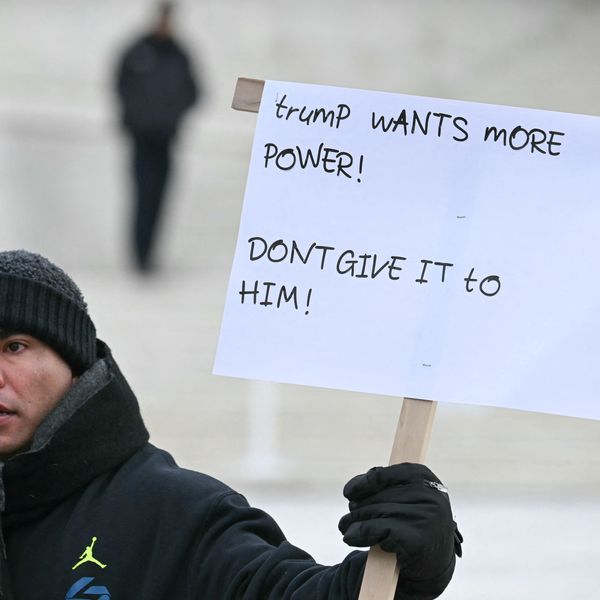
This picture taken on October, 5, 2020 shows logos of social networks Facebook, Instagram, and mobile messaging service WhatsApp on the screens of a smartphone and a tablet in Toulouse, southwestern France. (Photo: Lionel Bonaventure/AFP via Getty Images)
Court Ruling in Facebook's Favor Seen as Reason for Urgent Antitrust Reform
"Once again, our antitrust laws have been shown by the courts to be woefully inadequate to address the abuses of the richest companies in the world."
A federal court's Monday dismissal of lawsuits against Facebook brought by the Federal Trade Commission and a coalition of state attorneys general elicited fresh calls for antitrust reform.
"Once again, our antitrust laws have been shown by the courts to be woefully inadequate to address the abuses of the richest companies in the world," said Alex Harman, competition policy advocate for Public Citizen, in response to the ruling.
At issue are two decisions from U.S. District Judge James Boasberg regarding complaints filed in December at the U.S. District Court for D.C. by the Federal Trade Commission (FTC) and 48 state attorneys general, both of which accused Facebook of abusing its market power and scrutinized the company's acquisitions of the photo-sharing platform Instagram in 2012 and the messaging service WhatsApp in 2014.
"The FTC has failed to plead enough facts to plausibly establish... that Facebook has monopoly power in the market for Personal Social Networking (PSN) Services," Boasberg wrote in his ruling (pdf). The coalition of states led by New York Attorney General Letitia James, he further determined (pdf), targeted alleged Facebook violations that were too "long-past."
Boasberg said the FTC can file a new complaint within 30 days.
According to Sarah Miller, executive director of the American Economic Liberties Project, the pair of decisions "clearly underscores why Congress must pass bright-line standards to guide courts as they judge unfair methods of competition."
A number of actions should happen immediately, she said, including for the FTC to file a new complaint and for the state AGs to appeal.
Lawmakers should also take as a model New York state Senate Bill 933, which passed the Senate earlier this month. According to lead sponsor Senate Deputy Leader Michael Gianaris, a Democrat, the proposal would shift interpretations of antitrust law by "moving from the existing monopoly standard to the 'abuse of dominance' standard."
Miller called on Congress to act because the "idea that Big Tech operates in a functioning free market can no longer be taken as a serious position."
Public Citizen's Harmon pointed to a package of antitrust legislation taking aim at Big Tech's power passed last week by the House Judiciary Committee as a step in the right direction.
"Additional reforms to the antitrust laws will be necessary to stop powerful corporate monopolies from harming consumers, workers, innovators, and our democracy," he said. "Facebook is one of the worst offenders, and it's long past time for this company to be broken up."
An Urgent Message From Our Co-Founder
Dear Common Dreams reader, The U.S. is on a fast track to authoritarianism like nothing I've ever seen. Meanwhile, corporate news outlets are utterly capitulating to Trump, twisting their coverage to avoid drawing his ire while lining up to stuff cash in his pockets. That's why I believe that Common Dreams is doing the best and most consequential reporting that we've ever done. Our small but mighty team is a progressive reporting powerhouse, covering the news every day that the corporate media never will. Our mission has always been simple: To inform. To inspire. And to ignite change for the common good. Now here's the key piece that I want all our readers to understand: None of this would be possible without your financial support. That's not just some fundraising cliche. It's the absolute and literal truth. We don't accept corporate advertising and never will. We don't have a paywall because we don't think people should be blocked from critical news based on their ability to pay. Everything we do is funded by the donations of readers like you. Will you donate now to help power the nonprofit, independent reporting of Common Dreams? Thank you for being a vital member of our community. Together, we can keep independent journalism alive when it’s needed most. - Craig Brown, Co-founder |
A federal court's Monday dismissal of lawsuits against Facebook brought by the Federal Trade Commission and a coalition of state attorneys general elicited fresh calls for antitrust reform.
"Once again, our antitrust laws have been shown by the courts to be woefully inadequate to address the abuses of the richest companies in the world," said Alex Harman, competition policy advocate for Public Citizen, in response to the ruling.
At issue are two decisions from U.S. District Judge James Boasberg regarding complaints filed in December at the U.S. District Court for D.C. by the Federal Trade Commission (FTC) and 48 state attorneys general, both of which accused Facebook of abusing its market power and scrutinized the company's acquisitions of the photo-sharing platform Instagram in 2012 and the messaging service WhatsApp in 2014.
"The FTC has failed to plead enough facts to plausibly establish... that Facebook has monopoly power in the market for Personal Social Networking (PSN) Services," Boasberg wrote in his ruling (pdf). The coalition of states led by New York Attorney General Letitia James, he further determined (pdf), targeted alleged Facebook violations that were too "long-past."
Boasberg said the FTC can file a new complaint within 30 days.
According to Sarah Miller, executive director of the American Economic Liberties Project, the pair of decisions "clearly underscores why Congress must pass bright-line standards to guide courts as they judge unfair methods of competition."
A number of actions should happen immediately, she said, including for the FTC to file a new complaint and for the state AGs to appeal.
Lawmakers should also take as a model New York state Senate Bill 933, which passed the Senate earlier this month. According to lead sponsor Senate Deputy Leader Michael Gianaris, a Democrat, the proposal would shift interpretations of antitrust law by "moving from the existing monopoly standard to the 'abuse of dominance' standard."
Miller called on Congress to act because the "idea that Big Tech operates in a functioning free market can no longer be taken as a serious position."
Public Citizen's Harmon pointed to a package of antitrust legislation taking aim at Big Tech's power passed last week by the House Judiciary Committee as a step in the right direction.
"Additional reforms to the antitrust laws will be necessary to stop powerful corporate monopolies from harming consumers, workers, innovators, and our democracy," he said. "Facebook is one of the worst offenders, and it's long past time for this company to be broken up."
A federal court's Monday dismissal of lawsuits against Facebook brought by the Federal Trade Commission and a coalition of state attorneys general elicited fresh calls for antitrust reform.
"Once again, our antitrust laws have been shown by the courts to be woefully inadequate to address the abuses of the richest companies in the world," said Alex Harman, competition policy advocate for Public Citizen, in response to the ruling.
At issue are two decisions from U.S. District Judge James Boasberg regarding complaints filed in December at the U.S. District Court for D.C. by the Federal Trade Commission (FTC) and 48 state attorneys general, both of which accused Facebook of abusing its market power and scrutinized the company's acquisitions of the photo-sharing platform Instagram in 2012 and the messaging service WhatsApp in 2014.
"The FTC has failed to plead enough facts to plausibly establish... that Facebook has monopoly power in the market for Personal Social Networking (PSN) Services," Boasberg wrote in his ruling (pdf). The coalition of states led by New York Attorney General Letitia James, he further determined (pdf), targeted alleged Facebook violations that were too "long-past."
Boasberg said the FTC can file a new complaint within 30 days.
According to Sarah Miller, executive director of the American Economic Liberties Project, the pair of decisions "clearly underscores why Congress must pass bright-line standards to guide courts as they judge unfair methods of competition."
A number of actions should happen immediately, she said, including for the FTC to file a new complaint and for the state AGs to appeal.
Lawmakers should also take as a model New York state Senate Bill 933, which passed the Senate earlier this month. According to lead sponsor Senate Deputy Leader Michael Gianaris, a Democrat, the proposal would shift interpretations of antitrust law by "moving from the existing monopoly standard to the 'abuse of dominance' standard."
Miller called on Congress to act because the "idea that Big Tech operates in a functioning free market can no longer be taken as a serious position."
Public Citizen's Harmon pointed to a package of antitrust legislation taking aim at Big Tech's power passed last week by the House Judiciary Committee as a step in the right direction.
"Additional reforms to the antitrust laws will be necessary to stop powerful corporate monopolies from harming consumers, workers, innovators, and our democracy," he said. "Facebook is one of the worst offenders, and it's long past time for this company to be broken up."

